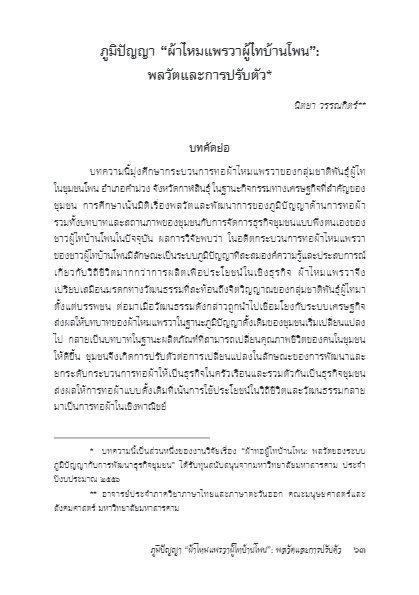นิตยา วรรณกีตร์
บทคัดย่อ
บทความนี้มุ่งศึกษากระบวนการทอผ้าไหมแพรวาของกลุ่มชาติพันธุ์ผู้ไทในชุมชนโพน อำเภอคำม่วง จังหวัดกาฬสินธุ์ ในฐานะกิจกรรมทางเศรษฐกิจที่สำคัญของชุมชน การศึกษาเน้นมิติเรื่องพลวัตและพัฒนาการของภูมิปัญญาด้านการทอผ้า รวมทั้งบทบาทและสถานภาพของชุมชนกับการจัดการธุรกิจชุมชนแบบพึ่งตนเองของชาวผู้ไทบ้านโพนในปัจจุบัน ผลการวิจัยพบว่า ในอดีตกระบวนการทอผ้าไหมแพรวาของชาวผู้ไทบ้านโพนมีลักษณะเป็นระบบภูมิปัญญาที่สะสมองค์ความรู้และประสบการณ์เกี่ยวกับวิถีชีวิตมากกว่าการผลิตเพื่อประโยชน์ในเชิงธุรกิจ ผ้าไหมแพรวาจึงเปรียบเสมือนมรดกทางวัฒนธรรมที่สะท้อนถึงจิตวิญญาณของกลุ่มชาติพันธุ์ผู้ไทมาตั้งแต่บรรพชน ต่อมาเมื่อวัฒนธรรมดังกล่าวถูกนำไปเชื่อมโยงกับระบบเศรษฐกิจ ส่งผลให้บทบาทของผ้าไหมแพรวาในฐานะภูมิปัญญาดั้งเดิมของชุมชนเริ่มเปลี่ยนแปลงไป กลายเป็นบทบาทในฐานะผลิตภัณฑ์ที่สามารถเปลี่ยนคุณภาพชีวิตของคนในชุมชนให้ดีขึ้น ชุมชนจึงเกิดการปรับตัวต่อการเปลี่ยนแปลงในลักษณะของการพัฒนาและยกระดับกระบวนการทอผ้าให้เป็นธุรกิจในครัวเรือนและรวมตัวกันเป็นธุรกิจชุมชน ส่งผลให้การทอผ้าแบบดั้งเดิมที่เน้นการใช้ประโยชน์ในวิถีชีวิตและวัฒนธรรมกลายมาเป็นการทอผ้าในเชิงพาณิชย์
กระบวนการเปลี่ยนแปลงดังกล่าวสะท้อนถึงวิธีการเรียนรู้และการปรับตัวของชุมชนเพื่อให้สอดคล้องกับสถานการณ์จากภายนอกชุมชน ด้วยการนำภูมิปัญญาดั้งเดิมของชุมชนมาผสมผสานและประยุกต์ให้เกิดประโยชน์ในการประกอบอาชีพและการดำรงชีวิต การรวมกลุ่มในการทอผ้าไหมแพรวา ส่งผลให้เกิดองค์กรชุมชนที่ช่วยสร้างความสมานฉันท์ของคนในชุมชนและทำให้ชุมชนมีความเข้มแข็ง ธุรกิจชุมชนด้านการทอผ้านอกจากมีบทบาทต่อความเข้มแข็งของชุมชนแล้ว ยังสามารถพัฒนาศักยภาพของคนในชุมชนด้านต่างๆ ทั้งทางตรงและทางอ้อม นับเป็นพื้นฐานที่ดีในการรองรับการพัฒนาศักยภาพของชุมชนในด้านอื่น นอกจากนี้การทอผ้ายังเปิดโอกาสให้คนในชุมชนได้มีส่วนร่วมในกิจกรรมลักษณะอื่นที่สัมพันธ์กัน เช่น กลุ่มโฮมสเตย์ กลุ่มตัดเย็บเสื้อผ้า กลุ่มปลูกหม่อนเลี้ยงไหม เป็นต้น ลักษณะดังกล่าวสะท้อนให้เห็นว่าชุมชนบ้านโพนเป็นชุมชนที่สามารถนำภูมิปัญญาดั้งเดิมมาพัฒนาและปรับใช้ เพื่อให้เกิดช่องทางเลือกในการประกอบอาชีพอย่างเหมาะสมกับการเปลี่ยนแปลงของสังคมโดยไม่ทำลายวัฒนธรรมดั้งเดิม การทอผ้าไหมแพรวาของชาวผู้ไทบ้านโพนจึงเป็นสิ่งเชื่อมต่อสำนึกทางวัฒนธรรมของชุมชนจากอดีตสู่ปัจจุบันและเป็นปัจจัยชี้ความสำเร็จ โดยเฉพาะการสร้างชุมชนให้เข้มแข็งและพึ่งตนเองได้อย่างยั่งยืน
(ตีพิมพ์ใน วารสารไทยศึกษา ปีที่ 10 ฉบับที่ 2 (สิงหาคม 2557 – มกราคม 2558) หน้า 63-86)
Wisdom in “Phrae-Wa Silk of Phu Thai, Baan Phon” : Dynamic and Assimilation
Nittaya Wannakit
Abstract
This article aims to examine the process of weaving Phrae-Wa silk by Phu Thai ethnic groups, located in Phon community, Khum-muang, Kalasin Province. Such a process has taken on the role as an important economic scheme of the community. The study focuses on two main aspects: the dynamic and expansion of the knowledge of weaving clothes; and the role and status of the community in managing the community to be a self-sufficiency business of the Phu Thai people in Baan Phon. The findings show that the process of Phrae-Wa silk weaving was developed through collective wisdom and experiences, instead of merely being produced for economic profit. The Phrae-Wa silk represents cultural heritage that conveys the essence of the Phu Thai ethnic group since its origins. Such cultural heritage then has been bound to a business system in a transition role of the Phrae-Wa silk as the traditional wisdom of the community. The silk product has become a substitution for a better quality of life in the community. Hence, people have adapted to change and transformed their weaving process from household commerce to a community business. The traditional weaving which served as the people lifestyle and culture accordingly has become commercial weaving.
The transition of the weaving process reveals the community’s approach and transformation according to the situation from the external society. From the application of their traditional wisdom, the community has created opportunities for their earning and living. In addition, the group of Phrae-Wa silk weavers has been transformed into a community organization to promote the people’s compatibilities and strengths and contribute to the progresses of the people’s various capacities, both directly and indirectly. Therefore, this has become a good source to serve other potential development in the community. The weaving helps the community engage in other complementary activities, such as home-stay, garments, mulberry farming for silkworm, etc. The above mentioned demonstrates that the Baan Phon community has been able to retain its traditional wisdom, which was then developed and applied to the community’s way of earning a living. This also reflects social change without eliminating the traditional culture. The Phrae-Wa weaving of the Phu Thai ethnic group in Baan Phon manifests the bond of the community’s cultural conscience from the past to present. This can be an indication, particularly, to encourage the community’s strength and sustainable self-reliance.
(Published in Journal of Thai Studies Volume 10 Number 2 (August 2014 – January 2015) Page 63-86)
บทความ / Full Text : Download
